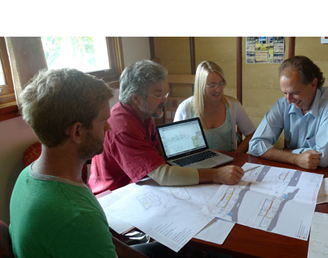Pain avoidance and the dying art of learning
Posted by admin on 17/06/2011 at 6:10 amPain avoidance and the dying art of learning
…is humanity capable of change before it feels pain?
Animals are adept at avoiding pain, but generally only after at least one exposure to the cause. Sometimes we can see that ingrained in their innate behavior, other times it must be learnt from parents, or at its most risky by exposure to a previously unknown cause of pain. Where that pain is terminal, species that did not ingrain the learning in one way or another are generally extinct. Survival depends on whether the collective experience has time to adapt before extinction strikes.
In the broad sweep of human history, how many times has a great civilisation foreseen future difficulty, or catastrophe, and made changes to avert its worst effects, much less avert it altogether? I am quite prepared to accept that there are exceptions to the rule, but I reckon that the general rule is almost never.
Obvious examples include the Incas, the Mayans, Easter Island, the Egyptian Pharaohs, the ancient Greek and Roman Empires, Byzantium, and Angkor Wat. These are stand-outs, and each had its own unique situation and circumstances – yet each fell from their former glory when they failed to account for some unfolding reality that was greater than they were, whether political, military, ecological or climatic. In more recent times we have witnessed the decline if not fall of the British Empire, the USSR, and probably in future the USA. As each of these recent empires has arisen in a global context (unlike the more regional empires of the ancient world), the reasons for the decline are also more complex, and the USA may yet defy history and regain its previous pre-eminence. More likely, it will slide slowly beneath the increasing bow wave of the emerging economic behemoth that is the Indo-Chinese economies. If human society lasts long enough in its present form, in a hundred years or more we may witness the succession pass to Africa, which will probably follow the Asian path to economic development through the initial provision of cheap labour, followed by increasing capital growth and affluence – but that is crystal ball gazing.
My purpose here is to think about whether society as it now stands will look ahead at the unfolding climatic disaster we are confronting, and make drastic last minute changes that may avert the worst of it; or, is human society (and perhaps we individually) unable to take the warnings seriously until real harm – real pain, in fact – is inflicted upon those in the positions of power to make those changes. Or perhaps, if the pain is not felt directly by those in power, it will be felt vicariously, not through empathy, but through damage to the economic system that sustains their wealth. Among this group of apparently heartless individuals I find myself seated, comfortably for now: my home is not sinking beneath the South Pacific’s waves (the few inhabitants of Kirabati are not global decision makers); I am wealthy enough to pay more for my food (I am not a Bangladeshi peasant at the bottom of the rice supply food chain); I am not a polar bear whose feeding range is shrinking dramatically.
The great civilisations mentioned above (allow me the license to call Easter Island great – it was certainly interesting!) all declined or collapsed for different reasons, although some common threads can be found. The Inca and Angkor Wat ran out of water, which was either a trigger or the last straw. The Mayans may have had similar troubles. The Romans ran low on moral leadership and had overreached the limits of communications and logistics. The Greeks failed to see the Romans coming. The USSR had a failure of an inadequate economic model coupled with a rising desire for democratic freedoms by its many coopted states. Great Britain was blindsided by two world wars within two decades at a time when national independence, democracy and personal freedom were becoming de rigour across the globe. The USA’s decline – if it happens – will paradoxically be at the hands of unrestrained freedom in the hands of a powerful few with no sense of social responsibility, honesty or accountability, cast against the backdrop of emerging Asian super-economies which are unfettered by debt, or accountability.
We can look at each of these and see the cause of the downfall. We could have warned them. But would they have listened? Would the residents of Angkor Wat have believed us if we had warned of a series of failed monsoons, if such had never been experienced before? Perhaps the Greeks would have listened, but would they have had the political capacity to prepare? I’m sure the US Reserve was warned about the debt structure of banks Fanny Mae and Freddy Mac (who would trust banks with names like that?) but obviously paid insufficient heed. Perhaps the unnamed grey-faced men in the Kremlin foresaw the collapse of the USSR, and continued to rely on their trusted method of oppression in attempt to keep the ship together. Perhaps in retrospect they would try another method, but it’s too late now – the USSR is extinct (although Russia continues as something of a struggling quasi-super-power).
In the 21st century, all global societies have a loose coalescence that sees humanity behave, for the very first time in all of Earth’s history, as non-homogenous mass. Ironically, it was John Howard who said “The things that unite us are greater than the things that divide us.” Ironic because he saw, and was happy to maintain, divisions between different cultures. Yet that unity is what is beginning to characterise humanity now – a disparate crawling mass that comes together, then separates into parts, then comes together again, in all manner of behaviours and activities. Some of these activities are primeval: food gathering/work, sex/family, even sleep. Some are characteristic of increasing affluence: buying/consumption, recreation/tourism etc. Others are reflective of the desire to provide protection to one’s own: xenophobia/oppressive immigration controls, trade barriers/protectionism, mono-culturalism/myopia. Yet others are the exact opposite, sometimes simultaneously displayed by the same societies: civic mindedness/charity support/foreign aid, cultural diversity/cultural curiosity.
In the absence of a global government (note that the UN is nothing like a government in its goals or practice), the various nations of the world appear to be the collective representatives of its people. But in reality, various other ‘representations’ give humanity alternative vehicles in which to gather, move, and galvanise for various actions. Examples include AVAAZ, GetUp!, and the various social media (as seen in the recent popular uprisings across the Middle East). Seen across all avenues of collective expression, humanity can now move loosely together, as one. It can now collectively react to information in a way it has never been able to before. But just because it can, doesn’t mean it will.
The growing reality of climate change is testing mankind’s ability to collectively anticipate potential harm, and change behaviours to avoid it. At present this actually means react to avoid the worst of it, since the opportunity to avoid any consequences at all has passed. Our ability to react quickly now will make the difference between the need for significant adaption with minimal social collapse (minimal pain), and significant catastrophic ecosystem changes resulting in major socio-economic collapse (major pain). Major pain in this case may not mean the extinction of the species, but it will certainly mean collapse of the current socio-economic system, with the death and suffering of billions of people. That is major pain. If I could live long enough, and detach myself sufficiently from my family and society, this would be an interesting experiment. Unfortunately, we are blessed or cursed with moral sense, and I cannot disconnect from making this very much a piece of action-research. Wake up Australia, wake up world!
Will we?
Sustainable House Design
We will help you create a family home that works well, feels good, is kind to the environment, culturally appropriate and reduces your energy and running costs.
Read MoreSustainable Commercial Buildings
We design your building to help reduce your operating costs, optimize the life cycle of your building, increase your property value and increase employee productivity.
Read MoreWorking with Envirotecture
We design beautiful, sustainable buildings that work for you, your family or your business. Full range of building design, consulting and training services.
Read More






















